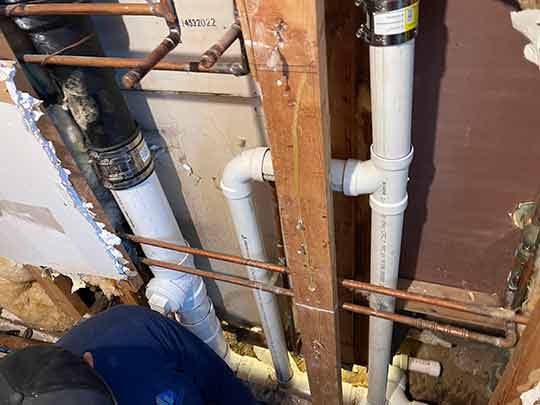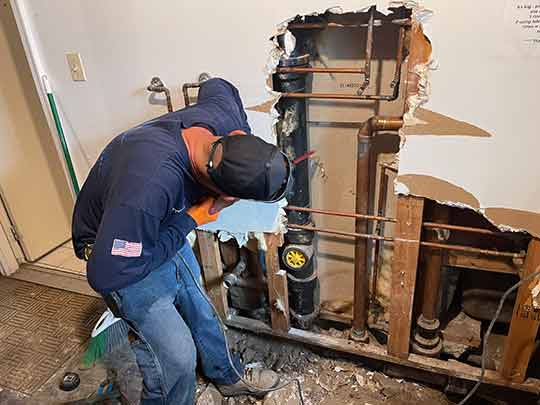
Plumbing systems don’t last forever; at some point, they must be replaced, says TRI Property Pros Management. When the issues in your plumbing become so bad that the cost of fixing them is greater than the cost of replacing the pipes, it is time to repipe your home.
Some of the problems you will see in your plumbing if your home needs repiping include:
- Recurring leaks: Pipes that are old and fragile will leak frequently. Fixing the leak may even worsen the problem by creating more leaks.
- Low water pressure: Sometimes you can notice a low water pressure. If the problem is not from the municipal water supply and the pipe is not leaking, it could be that the pipe channel is severely clogged.
- Discolored water: Brown/yellowish, bad-tasting, and smelly water can be due to leaks or severe sedimentation within the pipe channel.
Your home may also need repiping if:
- Your pipes are old: All plumbing pipes come with a use-before date. Pipes that have reached this date should be replaced.
- You have lead/galvanized steel pipes: Since the 1980s lead water lines have been banned. Because of their high rate of corrosion, galvanized pipes are no longer used in homes.
- You are remodeling your home: If you are planning to remodel your kitchen or bathroom, you can save money and time by taking this opportunity to also repipe your home.
Home repiping; what does it involve?
When repiping your home, the existing cold/hot water pipes, as well as, drain lines are removed and replaced with new ones. As can be imagined, this painstaking process takes a lot of time and money, which is why, you want to make sure to do it right.
What does the actual home repiping process look like?
Professional assessment
Involving an expert in this project, from start to finish, ensures that problems in your home are accurately diagnosed and the solutions properly implemented. It is not possible, just by looking at the plumbing issues in your home, to determine if your home needs repiping or how much of your plumbing needs to be replaced. Getting a professional plumber to inspect the plumbing will tell you the kind of damage and scope of work required. A competent plumber also ensures your new pipe is installed according to current plumbing standards.
Getting your home ready
Depending on the amount of work to be done, you can do this yourself to save costs. But if it is a lot of work, it is better to let the plumber handle it. To prepare your home for repiping, you must take steps to prevent damage to your furniture and appliances. Typically, because the plumber will cut into the drywall, you have to spread plastic sheets or tarp over your belongings to protect them. Your water supply will also be shut off during this period; meaning your home may be unlivable throughout the project.
Choose your pipes
It makes sense to use a better alternative to your existing pipes, even if you don’t have lead or galvanized steel pipes in your home. Typically, you have to choose between PEX, copper, and CPVC. All three types of pipe materials come with their unique advantages and drawbacks, plus specific cost implications.
- Copper: It is more durable than PEX and doesn’t corrode. It is heat-resistant and can withstand shocks from earthquakes. Copper doesn’t breed bacteria and it lasts for decades. However, it is prone to freezing, requires insulation and it is costly.
- PEX: It is flexible and less prone to water hammers. It is more affordable than copper and easier to install. PEX pipes are naturally insulated, so they are less likely to freeze and will not crack even if they freeze. But they are less durable than copper pipes.
- CPVC: They are easy to work with and cheap. CPVC pipes have high acidity resistance. However, they are prone to cracking during an earthquake and cost more than PVC.
Some materials, like PEX, need an installer who is certified for that kind of installation. Some plumbers also prefer to work with specific materials.
Repipe your home
After covering your belongings with plastic sheets, the plumber will mark the exact location of the pipes within the walls of your house. Depending on the type of foundation they may access the pipes inside the flooring through the ceiling or basement or by digging into the subfloor. If you are replacing your main water line and drain lines the plumber may need to excavate in your yard. Because you have to fix your damaged landscaping afterward, this will increase your costs.
How long does it take to repipe your home? It depends on the size of your home and the number of fixtures that need to be fitted. But generally, you can expect the entire process to take a maximum of one week. For smaller houses, it can take a few days.
This also depends on the quality of the plumber you hire for the project. A competent plumber can minimize the amount of disruption to your family. By preparing adequately and avoiding amateurish mistakes a professional plumber will save you time and money.



